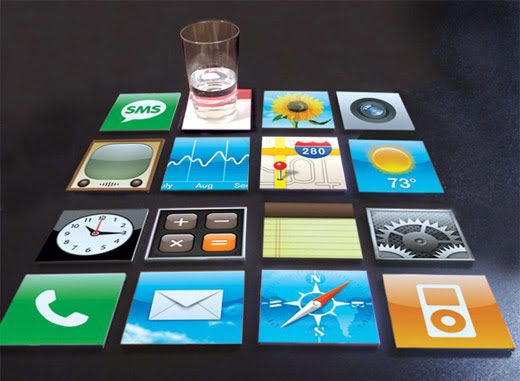Tuesday, November 9, 2010
There's An App For That!
It's been a while since I spent any noticeable leisure time away from my computer, the mothership of my technological world, but, this afternoon, I did just that. I relocated to the living room for a few hours. Now, that doesn't mean I removed myself from the world of electronics, far from it, but it did take me away from my main communication outlet. I didn't realize how much I have come to take this thing for granted. I still had television, video games, and, I thought, a powerful phone, but I felt limited. I mean, my computer allows me to communicate in more ways than I can count (e-mail, social networks, blogs, instant messenger, etc.), view and edit media (images, videos, animations, music, etc.), peruse the internet, enjoy a touch of gaming, and perform the many office-related tasks I don't even notice (microsoft office (word, excel, powerpoint, etc.)). I was pretty sure I wouldn't even notice being limited to just a phone, but, seeing my glorious little iPhone lag between actions caused me to realize both how much we rely on our little communication gadgets and how much these gadgets have acted against their originally proposed purpose.
Many would argue that we are at somewhat of a peak in a communication revolution, but, though I agree on a technological level, I would argue the inverse.
If one were to research the term "communication revolution", it would, most likely find articles referring to the advancements of the nineteenth century that bridged communication gaps in implausible manners. There was the postal system which facilitated the transmission of written and physical materials across great distances in an organized manner. There was the telegraph which used a network of wires to transmit electronic messages across continents in a manner quicker than any transportation means. There was the phonograph which allowed the duplication of sounds (music) in locations far from the original performance. There was the proliferation of advanced newspaper presses that allowed the sharing of information across vast outlets in a manner to be enjoyed at different times of availability (when someone had the time to read). Lastly, there were photography and motion pictures which allowed the duplication of visual events for those not able to attend the time and location of their origin.
Looking back, these technologies feel dated and ineffective, but they draw on a different society. They allowed a sense of togetherness across great distances that physical means could not imagine to bridge. They made the company of loved ones feel less distant (family and friends stationed or residing oversees for instance). They made performances transmissible to our homes and to communities that could not attend them. They distributed them for the present enjoyment and preserved them for future reference. They closed the gaps of distance.
Since then, we have made more advances than many of us realize, such an abundance that there are enough to ignore. We find ourselves, however, attached to a select few, a core group. Though we find ourselves attached to computers for their processing power and entertainment, there are others I would rather discuss. What I want to talk about is the misuse of the numerous communication channels we have created. We find ourselves with the abilities of emailing, texting, tweeting, messaging or calling those with whom we care to associate instead of feeling the necessity to connect with physical proximity. Now, I'm not speaking in a suggestive manner. I'm referring to simply being in the same place at the same time. We feel that these communication channels create a sense of closeness, but I am arguing that they push us apart. We find ourselves in a little bubble of our screens, feeling like we are connected, and, in a sense, we are, but take away that little device, and we are alone. We used to have to go out, hang out, see movies, get coffee, go to the movies, or even just watch television at a friends house to feel like we were connected. Now, we unconsciously feel as if we are connected when we are in our own room, chatting with those we know. I know I am more guilty of this than some, but I think that needs to change. These communication advances we all cherish have pushed us over a peak in a mountain of proximity and true communication and sent us on a nasty slide down the other side. They can and do allow us to communicate in more practical ways than we once could, ways that only a bold few were able to imagine, but these methods have been misused. We complacently take them for granted, in place of the true contact and breaking of bread with those around us.
So, let's go back to using these tools only when they promote true connections and are simply filling a communication void. Let's not use them to replace but merely to enhance that which, without them, we could and should already have. Let's go back to textual communication only when their is no substitute (you can still get out a pen and write a letter though). Let's ditch the tweet. Let's swap texting and e-mail for a real conversation. Let's trade the phone for a face-to-face. Let's go back to the times of family meals, sitting around the den, and sharing a beer with friends. Let's go back to the time of the telegram. It may sound insane, but if you are with me on the last one, there's an app for that (link below)!
As a side note, the image above is of iPhone App Coasters, and they are available for sale (link below).
Links:
App Coasters: Store
Telegram Service: Service
Subscribe to:
Post Comments (Atom)

No comments:
Post a Comment